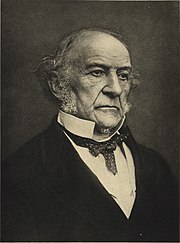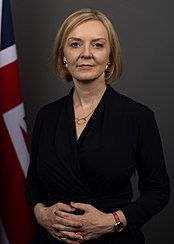
The prime minister of the United Kingdom is the head of government of the United Kingdom. The prime minister advises the sovereign on the exercise of much of the royal prerogative, chairs the Cabinet, and selects its ministers. As modern prime ministers hold office by virtue of their ability to command the confidence of the House of Commons, they sit as members of Parliament.

The secretary of state for the Home Department, more commonly known as the Home Secretary, is a senior minister of the Crown in the Government of the United Kingdom and the head of the Home Office. The position is a Great Office of State, making the home secretary one of the most senior and influential ministers in the government. The incumbent is a statutory member of the British Cabinet and National Security Council.

The Cabinet of the United Kingdom is the senior decision-making body of the Government of the United Kingdom. A committee of the Privy Council, it is chaired by the Prime Minister and its members include Secretaries of State and senior Ministers of State. Members of the Cabinet are appointed by the Prime Minister and are by convention chosen from members of the two houses of the Parliament of the United Kingdom, the House of Commons and the House of Lords.
In the United Kingdom there are at least six Lords Commissioners of His Majesty's Treasury, serving as a commission for the ancient office of Treasurer of the Exchequer. The board consists of the First Lord of the Treasury, the Second Lord of the Treasury, and four or more junior lords acting as whips in the House of Commons to whom this title is usually applied.
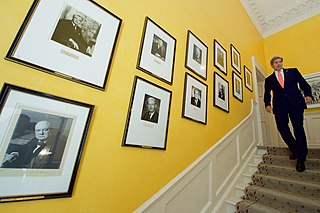
The article lists the records of prime ministers of the United Kingdom since 1721.

The leader of the Conservative Party is the highest position within the United Kingdom's Conservative Party. The current holder of the position is Rishi Sunak, who was elected to the position on 24 October 2022, following his unopposed victory in the party's leadership election.
This is a graphical timeline of prime ministers of Great Britain and the United Kingdom from when the first prime minister of Great Britain in the modern sense, Robert Walpole, took office in 1721, until the present day.

The modern political history of the United Kingdom (1979–present) began when Margaret Thatcher gained power in 1979, giving rise to 18 years of Conservative government. Victory in the Falklands War (1982) and the government's strong opposition to trade unions helped lead the Conservative Party to another three terms in government. Thatcher initially pursued monetarist policies and went on to privatise many of Britain's nationalised companies such as British Telecom, British Gas Corporation, British Airways and British Steel Corporation. She kept the National Health Service. The controversial "poll tax" to fund local government was unpopular, and the Conservatives removed Thatcher as Prime Minister in 1990, although Michael Heseltine, the minister who did much to undermine her, did not personally benefit from her being ousted.
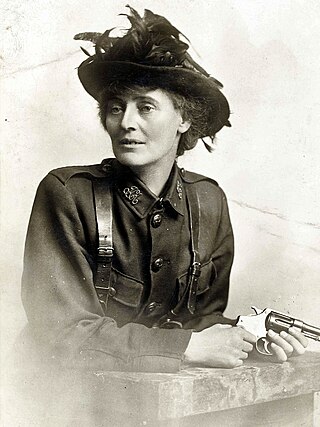
The representation of women in the House of Commons of the United Kingdom has been an issue in the politics of the United Kingdom at numerous points in the 20th and 21st centuries. Originally debate centred on whether women should be allowed to vote and stand for election as Members of Parliament. The Parliament Act 1918 gave women over 21 the right to stand for election as a Member of Parliament. The United Kingdom has had three female Prime Ministers: Margaret Thatcher (1979–1990), Theresa May (2016–2019), and Liz Truss (2022). The publication of the book Women in the House by Elizabeth Vallance in 1979 highlighted the under-representation of women in Parliament. In more modern times concerns about the under-representation of women led the Labour Party to introduce and, decades later, abandon all-women short lists, something which was later held to breach discrimination laws.

Mary Elizabeth Truss is a British politician who served as Prime Minister of the United Kingdom and Leader of the Conservative Party from September to October 2022. On her fiftieth day in office, she stepped down amid a government crisis, making her the shortest-serving prime minister in British history. The member of Parliament (MP) for South West Norfolk from 2010 to 2024, Truss held various Cabinet positions under three prime ministers—David Cameron, Theresa May and Boris Johnson—lastly as foreign secretary from 2021 to 2022.

Akwasi Addo Alfred Kwarteng is a British politician who served as the Chancellor of the Exchequer from 6 September to 14 October 2022 under Liz Truss and the Secretary of State for Business, Energy and Industrial Strategy from 2021 to 2022 under Boris Johnson. A member of the Conservative Party, he was the Member of Parliament (MP) for Spelthorne from 2010 to 2024.
The position of Prime Minister of the United Kingdom was not created as a result of a single action; it evolved slowly and organically over three hundred years due to numerous Acts of Parliament, political developments, and accidents of history.

The Truss ministry began on 6 September 2022 when Liz Truss was invited by Queen Elizabeth II—two days before the monarch's death—to succeed Boris Johnson as prime minister of the United Kingdom. Johnson resigned as leader of the Conservative Party the previous day after Truss was elected as his successor. The Truss ministry was formed from the 2019 Parliament of the United Kingdom, as a Conservative majority government.

Liz Truss's tenure as Prime Minister of the United Kingdom began on 6 September 2022 when she accepted an invitation from Queen Elizabeth II to form a government, succeeding Boris Johnson, and ended 49 days later on 25 October upon her resignation. As prime minister, she served simultaneously as First Lord of the Treasury, Minister for the Civil Service, and Minister for the Union.

On 23 September 2022, the Chancellor of the Exchequer, Kwasi Kwarteng, delivered a Ministerial Statement entitled "The Growth Plan" to the House of Commons. Widely referred to in the media as a mini-budget, it contained a set of economic policies and tax cuts such as bringing forward the planned cut in the basic rate of income tax from 20% to 19%; abolishing the highest (45%) rate of income tax in England, Wales and Northern Ireland; reversing a plan announced in March 2021 to increase corporation tax from 19% to 25% from April 2023; reversing the April 2022 increase in National Insurance; and cancelling the proposed Health and Social Care Levy. Following widespread negative response to the mini-budget, the planned abolition of the 45% tax rate was reversed 10 days later, while plans to cancel the increase in corporation tax were reversed 21 days later.
The October 2022 Conservative Party leadership election was triggered by Liz Truss's announcement that she would resign as Leader of the Conservative Party and Prime Minister of the United Kingdom, amid an economic and political crisis.

On 14 October 2022, the British tabloid newspaper the Daily Star began a livestream of an iceberg lettuce next to a framed photograph of Liz Truss, who had recently been appointed the prime minister of the United Kingdom. This act followed an opinion piece in The Economist that compared the expected brevity of Truss's premiership to the shelf life of a head of lettuce, with the October 2022 United Kingdom government crisis occurring weeks into her tenure and leading many political commentators to opine that Truss's resignation was imminent. She announced her resignation as prime minister on 20 October 2022, before the lettuce had wilted; the Daily Star subsequently declared the lettuce "victorious" over Truss.
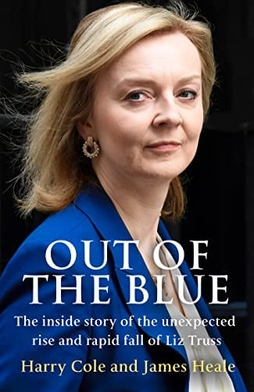
Out of the Blue: The Inside Story of the Unexpected Rise and Rapid Fall of Liz Truss is a non-fiction book about the British politician Liz Truss, written by Harry Cole and James Heale, published as an ebook on 1 November 2022 and in print and audio on 24 November.

